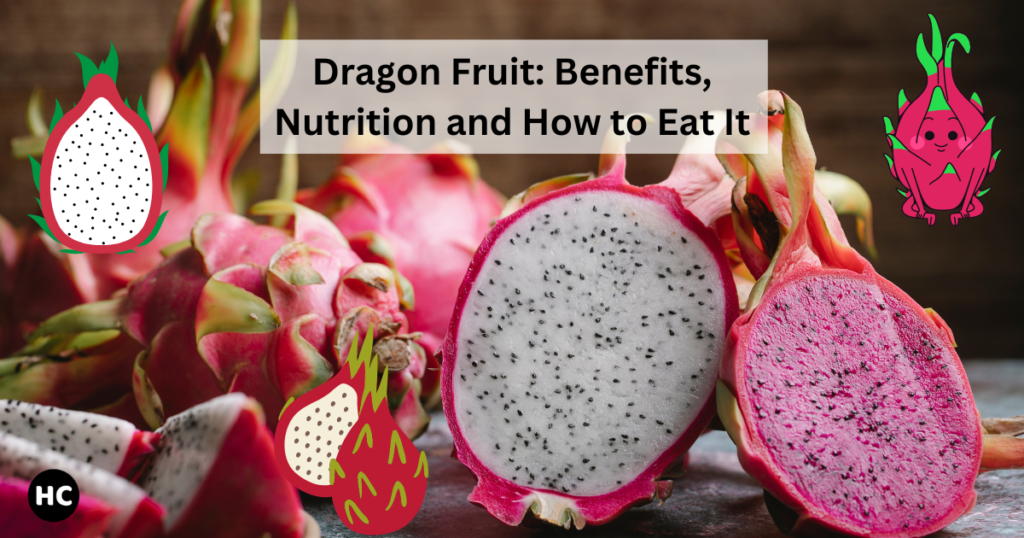Tropical fruits are not just for Instagram posts. They are incredibly delicious and pack a powerful nutritional punch. For example, dragon fruit, or strawberry pear, is a low-calorie fruit with prebiotic fiber and antioxidants that offers fantastic health benefits.
But not every piece of information about fruits and vegetables is necessarily true. There have been claims that dragon fruit is excellent for those with diabetes. But is there any truth to this? In this article, we will discuss all of these and more. Stay tuned until the end.
Diabetes and Dragon Fruit
Life with diabetes is challenging. Besides following the right treatment plan and exercising daily, you must also follow a strict diet to control your blood sugar levels. This often leaves you craving delicious treats.
While the jury is out on whether you can eat mangoes, dragon fruit is the perfect dessert. Dragon fruit has shown some promising results in helping manage type 2 diabetes and prediabetes. Dragon fruit is particularly beneficial for individuals with borderline diabetes. Due to its low sugar content, incorporating dragon fruit into your diet is effortless.
One hundred grams of dragon fruit has around 9 grams of sugar and 15 grams of carbohydrates, making it a low-glycemic-index food. But as with everything else, you must consult your healthcare provider before including dragon fruit in your daily diet to help manage diabetes.
Powerhouse of Nutrients
Dragon fruit offers the best of both worlds – it is packed with nutrients and surprisingly low in calories. You get many essential vitamins and minerals when you eat them, which is always good. Oh, and did I mention that it is also a great source of dietary fiber?
One cup of dragon fruit, around 227 grams, is roughly 136 calories. You would get anywhere from 3% to 10% of your body’s daily requirement of vitamins C and E and iron. Eating dragon fruit would also add 18% of the magnesium you would need daily. It also comes with 7 grams of fiber and zero fat.
Since dragon fruit is low in calories and carbohydrates, you can easily include it in your weight-loss diet. Frozen dragon fruit sorbet and dragon fruit ice cream make excellent treats when craving something delicious without wreaking havoc on your diet.
Fight Against Chronic Diseases with Antioxidants
Did you know that chronic diseases can actually be caused by long-term inflammation and cell damage? It’s all because of those pesky free radicals that form in your body!
Yes, it’s true. If there are too many free radicals in your body, they can cause oxidative stress. When that happens, your cells become damaged, making you prone to chronic diseases. To avoid this situation, you must eat foods high in antioxidants, which help fight free radicals in your body.
Dragon fruit is a prime example of a fruit packed with antioxidants. Research suggests that antioxidants, like those in dragon fruit, have potential health benefits and may be associated with reduced risk of chronic diseases like cancer and arthritis. However, it’s important to note that the link between antioxidant intake and disease prevention is still an area of ongoing research, and further studies are needed to establish definitive conclusions.
With that being said, dragon fruit is packed with:
- Vitamin C: A study conducted among nearly 121,000 participants showed that those with higher levels of vitamin C in their diet had a lower risk of neck cancer.
- Beta-carotene: Another antioxidant that has been linked with lower chances of cancer and cardiovascular diseases.
Packed with Fiber for Digestion and Heart Health
Dragon fruit is also a fantastic source of dietary fiber. According to experts, it is recommended that males consume a minimum of 38 grams of fiber per day, while females should aim for 25 grams of fiber daily.
It’s common for individuals to turn to fiber supplements to compensate for a low-fiber diet. However, this approach is not particularly effective. Unlike fiber derived from foods like dragon fruit, supplements do not offer the same advantages or benefits.
When your diet is high in fiber, it can help improve your digestive system. This research has also shown that dietary fiber can help prevent heart disease. Fiber is undoubtedly great for your health.
Dragon Fruit Can Give You a Healthy Gut and Immune System
Your gut has numerous microorganisms that work towards keeping you healthy. There are as many as 100 trillion such microorganisms. These also include at least 400 different types of beneficial bacteria.
Research has shown that any imbalance in the gut bacteria can cause health issues. Studies among humans and animals have consistently shown a link between asthma and gut health.
Dragon fruit is packed with prebiotics, which can help improve your gut health. Prebiotics are particularly helpful in keeping the gut’s balance in check. They are a particular kind of fiber that helps in the growth of healthy bacteria.
Some of the benefits of prebiotics for your gut are:
- They can reduce the instances of traveler’s diarrhea. A study conducted among travelers showed that those who had prebiotics before or during their trips had far fewer cases of this condition.
- They can help get rid of bad bacteria. Since prebiotics also promote good bacteria, they help eliminate harmful bacteria as a consequence. This means the chances of infection in your digestive tract are far lower.
- They can also help reduce the cases of diarrhea.
If you want to boost your immune system, you should also consider eating more dragon fruit. Let me explain.
Your immune system plays a key role in making sure you are not attacked by disease or viruses. If it has to do that effectively, you will need to eat foods such as dragon fruit that improve the immune system. The quality of your diet plays a vital role.
The white blood cells in your immune system are key to destroying anything that might harm your body. But these white blood cells are also prone to damage from free radicals. If there are too many free radicals, then the effectiveness of your white blood cells will decrease greatly.
Dragon fruit has vitamin C and carotenoids. They protect your white blood cells from incurring any damage. This, in turn, strengthens your immune system and keeps you protected from infections.
Improves Iron Levels for Oxygen and Energy
Iron is a crucial component of your body. It helps transport oxygen through your entire system. Iron plays a role in the production of enzymes involved in digestion and energy metabolism, but it is not responsible for the actual breakdown of food into energy.
Despite the importance of iron in our bodies, many people have an iron deficiency. Experts estimate that about 30% of the world’s population is low in iron.
Dragon fruit contains some iron. A serving of dragon fruit would give you only about 8% of your daily iron requirement, but some is better than none! Plus, the vitamin C in dragon fruit is an added advantage, as it can help your body absorb iron more efficiently.
Packed with Magnesium for Bones, DNA and Energy
On average, our bodies contain around 25 grams of magnesium. Although this quantity may appear small, it’s important to note that magnesium is present in every single cell of your body.
Magnesium also plays a vital role in over 600 chemical reactions within your body. It is involved in various processes, including:
- The formation of bones
- The creation of DNA
- The conversion of food into energy
- Among numerous other functions
Well, when it comes to magnesium content, dragon fruit does have some, but it’s not exactly a huge amount. However, research has shown that eating more magnesium can even help reduce the chances of heart disease or stroke.
No doubt, dragon fruit has some amazing health benefits. But before you include it in your daily diet, you also need to know about its possible side effects.
Side Effects of Dragon Fruit
Dragon fruit is generally safe to eat for most people, but there are some cases where it may cause adverse reactions or interactions. Some of the possible side effects of dragon fruit are:
- Allergic reactions: If you’ve never tried dragon fruit before, being cautious about potential allergic reactions is a good idea. Some individuals may be allergic to the fruit. To be safe, take a small piece and try it out, paying attention to any symptoms that may arise. Some symptoms include hives, itching, swelling, and other allergic symptoms like difficulty breathing or gastrointestinal issues. Also, if you are allergic to other tropical fruits, it is better to avoid eating dragon fruit. If you are determined to try dragon fruit despite having known allergies to similar fruits, it is advisable to proceed cautiously. Please note that even small amounts can still trigger allergic reactions in susceptible individuals, so it is vital to be aware of any symptoms.
- Digestive issues: Dragon fruit is high in fiber and fructose, which may cause gastrointestinal discomfort or diarrhea in some individuals. Like any food, consume dragon fruit in moderation as part of a balanced diet. Moderation ensures a diverse intake of nutrients and reduces the risk of potential adverse effects associated with excessive consumption.
- Medication interactions: Dragon fruit might not interact well with certain medications. If you are taking medications for specific health conditions, it’s important to consult your doctor to determine whether it is safe to consume dragon fruit.
- Some of the medications that may interact with dragon fruit are:
- Anticoagulants: Dragon fruit contains vitamin K, which can affect blood clotting and interfere with anticoagulant drugs such as warfarin.
- Statins: Dragon fruit contains pectin, which can lower cholesterol levels and affect the efficacy of statin drugs such as atorvastatin.
- Diabetes medications: Dragon fruit has a low glycemic index, but it still contains some sugar and carbohydrates that can affect blood sugar levels and insulin response. If you are taking diabetes medications such as metformin or insulin, you may need to adjust your dosage or monitor your blood sugar more closely when eating dragon fruit.
Kidney Stones (Oxalate): A Possible Risk
Dragon fruit contains oxalate, a naturally occurring compound that is present in leafy greens, cocoa, and other fruits too. When oxalate is taken into the body through dragon fruit or other food sources, it combines with minerals in your body. It forms calcium oxalate or iron oxalate.
For individuals who are susceptible to kidney stones, the presence of oxalate in dragon fruit can pose a potential concern. Oxalate can combine with minerals in the kidneys, leading to the formation of kidney stones.
If you have a history of kidney stones, then you should avoid eating dragon fruit. You should also drink plenty of water and limit your intake of other high-oxalate foods.
Conclusion
Dragon fruit is a tropical superfruit that offers many benefits for your health and wellness. It is low in calories and high in fiber, antioxidants, vitamins and minerals. It can help you manage your diabetes, prevent chronic diseases, improve your gut and immune system, and boost your iron levels.
However, dragon fruit may also have some side effects for some people, such as allergic reactions, digestive issues, medication interactions and kidney stones. You should be aware of these risks and consult your doctor before eating dragon fruit if you have any medical conditions or allergies.
Are you planning on including dragon fruit in your diet?
Let us know in the comments below!










